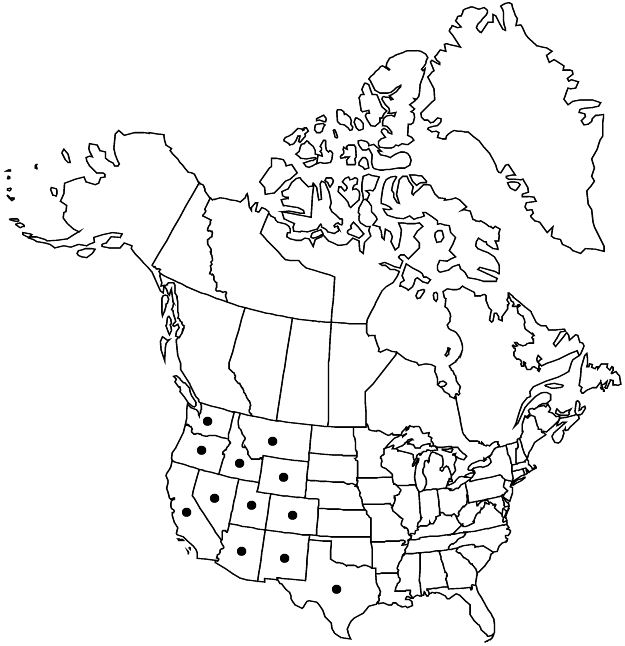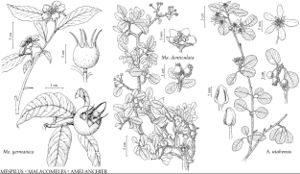Amelanchier utahensis
Gatt. Pomac., 25, plate 2, fig. 20e. 1890.
Shrubs, 0.5–5 m. Stems 1–100, often colonial, much branched. Leaves mostly or fully unfolded; petiole (3–) 6–13 (–22) mm; blade suborbiculate to oval or obovate, (14–) 21–36 (–63) × (9–) 16–32 (–54) mm, base usually rounded to subcordate, sometimes cuneate, each margin with 0–3 (–6) teeth on proximal 1/2 and (0–) 3–5 (–7) teeth in distalmost cm, largest teeth more than 1 mm, apex usually rounded to truncate or emarginate, sometimes acute and mucronate, abaxial surface moderately (sparsely or densely) hairy by flowering, sparsely to moderately hairy later, adaxial glabrous or sparsely (moderately) hairy later. Inflorescences (4–) 6–10 (–13) -flowered, (8–) 16–30 (–43) mm. Pedicels: (0 or) 1 or 2 (or 3) subtended by a leaf, proximalmost (2–) 7–16 (–25) mm. Flowers: sepals usually recurved after flowering, (1.6–) 2.6–4.2 (–6.5) mm; petals oblanceolate to oblong, (4.9–) 7.2–9.8 (–14) × (1.6–) 2.6–3.1 (–5.3) mm; stamens (9–) 13–19 (–20); styles (2 or) 3 or 4, (1.7–) 2.3–3 (–3.9) mm; ovary apex moderately to densely hairy (or glabrous). Pomes purplish black, 6–10 mm diam. 2n = 4x.
Phenology: Flowering Apr–May; fruiting Jul–Sep.
Habitat: Dry rocky slopes, canyons, stream banks, mountainsides, foothills, deserts
Elevation: 900–3500 m
Distribution

Ariz., Calif., Colo., Idaho, Mont., Nev., N.Mex., Oreg., Tex., Utah, Wash., Wyo., Mexico (Baja California)
Discussion
The sparsely to moderately hairy mature leaves and twigs, rounded to truncate or emarginate leaf apices, relatively short petals, and reduced numbers of stamens and styles are distinctive characteristics for the wide-ranging and common Amelanchier utahensis. Within 25 years of its publication, about a dozen names were published that G. N. Jones (1946) considered synonyms of A. utahensis. Some recent floras have recognized some of these synonymized taxa, including A. bakeri Greene, A. covillei, A. mormonica C. K. Schneider, A. oreophila A. Nelson, and A. venulosa Greene.
Selected References
None.
